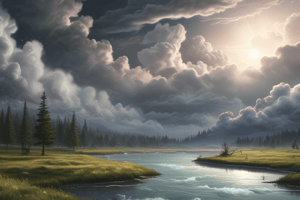Podcast
Questions and Answers
What is the process called when water falls from the sky in any form?
What is the process called when water falls from the sky in any form?
- Evaporation
- Transpiration
- Condensation
- Precipitation (correct)
What makes water able to move around more than most other materials?
What makes water able to move around more than most other materials?
- Its high melting point
- Its ability to change form easily (correct)
- Its high boiling point
- Its ability to dissolve many substances
What is the process of water changing from a liquid to a gas called?
What is the process of water changing from a liquid to a gas called?
- Evaporation (correct)
- Condensation
- Precipitation
- Transpiration
What happens when water in the air cools and changes back into a liquid?
What happens when water in the air cools and changes back into a liquid?
Why is water important for all life?
Why is water important for all life?
What is the term for the movement of water from the ground into the air?
What is the term for the movement of water from the ground into the air?
What are the three main forms of matter?
What are the three main forms of matter?
Why is it easy to turn water into a gas?
Why is it easy to turn water into a gas?
What is the main difference between water and most other substances?
What is the main difference between water and most other substances?
What is the process of water moving from the air to the ground called?
What is the process of water moving from the air to the ground called?
Flashcards are hidden until you start studying
Study Notes
Forms of Precipitation
- Rain, snow, sleet, and hail are all considered forms of precipitation.
Condensation
- Condensation is the process of water vapor (gas) turning into liquid water.
- It occurs when water vapor is cooled off enough.
- Examples include condensation on the outside of a cold cup and in clouds, which leads to rain formation.
Evaporation
- Evaporation is the process of water being heated, causing its molecules to defy gravity and break away from one another.
- It occurs whenever there is liquid water around.
- Evaporation changes water from a liquid to a gas called water vapor.
Transpiration
- Transpiration is the process by which water absorbed by plant roots evaporates directly out of their leaves.
- It is a normal process for plants and is an important part of the photosynthesis reaction.
Runoff
- Runoff occurs when rain falls or snow melts, and water moves downwards due to gravity.
- Runoff water can form rivers, lakes, or soak into the ground.
Plant Uptake
- Plant uptake is the process by which water is absorbed by the roots of plants.
Percolation
- Percolation is the process by which water sinks into the ground to become groundwater.
- Groundwater is a collection of freshwater trapped underground, often accessed through wells or porous rocks.
River Discharge and Collection
- After water moves downwards through runoff, it collects at the lowest point, forming lakes and oceans.
- This water becomes a major source for evaporation, leading to the formation of clouds and weather patterns.
Water Cycle
- Water is constantly on the move, cycling between rivers, oceans, plants, and the air.
- The water cycle involves evaporation, condensation, and precipitation, and is crucial for life on Earth.
States of Matter
- Matter has three main forms: solid, liquid, and gas.
- Water is unique in that it can change form easily, making it able to move around more than most other materials.
Water's Importance
- Water is essential for life, making up a large part of living organisms.
- Humans use water for drinking, cleaning, and recreation, and it is also vital for plants and other organisms.
Studying That Suits You
Use AI to generate personalized quizzes and flashcards to suit your learning preferences.




